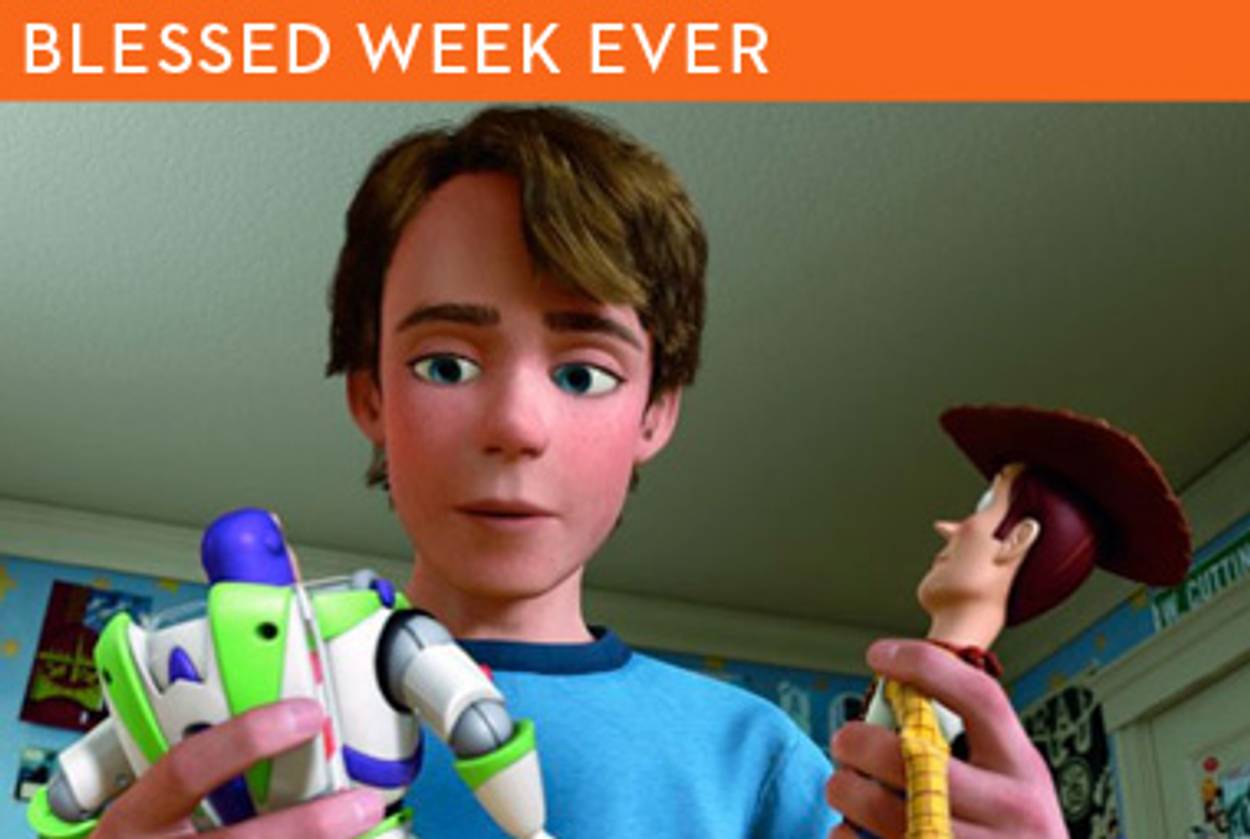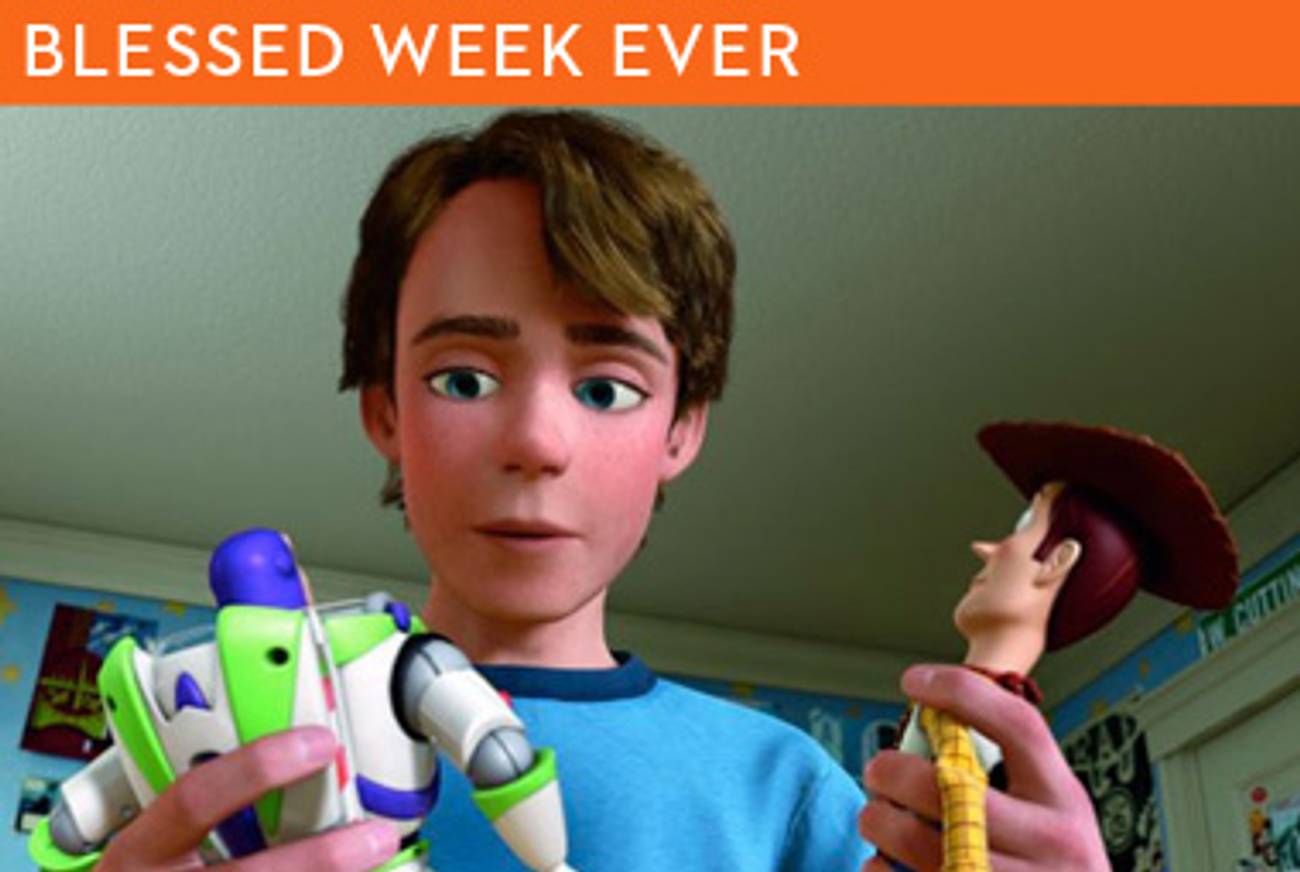Toy Soldiers
A haftorah of breaking down and sobering up




In the matter of the preponderance of existential angst among inanimate objects, few can match Woody, Buzz, and the other characters in the popular Toy Story franchise. Unlike most of cinema’s summer stock—a sticky syrup of expletives and explosions—the series, now in its third installment, revolves around playthings pondering their agency, mortality, and raison d’être. Good luck seeing Ashton Kutcher do the same.
Without giving away too much of the new film’s plot, it’s safe to say that it explores the same major theme as before, namely the devastating moment in which a toy realizes its owner has matured and is no longer interested in child’s play. It’s a moment burdened with more than the cheap sentimentality of mass-produced pop culture; watching the toys have their moment of reckoning, we are forced to have one of our own.
Everything is at stake. One of the Toy Story franchise’s most profound achievements is its ability to remind us how pure our vision was when we were children, when the objects laid at our feet weren’t merely 5-inch figures of polyethylene and fabric but fearless cowboys and daring space rangers.
Had he been around to visit the local multiplex, Walter Benjamin would have likely enjoyed Pixar’s creation. In a short essay, unpublished in his lifetime, Benjamin discussed the difference between the adult’s vision and the child’s. “Because children see with pure eyes, without allowing themselves to be emotionally disconcerted, [their sight] is something spiritual,” he wrote. “Children are not ashamed, since they do not reflect but only see.” This, he argued, was the reason children’s drawings cancel out “the intellectual cross-references of the soul,” creating instead “a pure mood, without thereby sacrificing the world.”
Pure mood is what Toy Story 3 is all about. It’s also the theme of this week’s haftorah. Like Buzz and Woody, the prophet Micah strikes an existential tone. Like the animated toys, he, too, is distraught by the notion that one day the being in whose grace we all live might lose interest in us and move on.
But unlike Andy, the toys’ owner, God himself doesn’t merely mature and abandon his knickknacks of old. Instead, Micah informs us, the Creator pursues a grim course of action: First he empowers his people—“all your enemies shall be destroyed”—and then he punishes them. “I will destroy the cities of your land,” God promises Israel, “and I will break down all your fortresses.”
It’s a bleak sequence of events. First comes redemption, then destruction. Why not the other way around? Why not suffering followed by salvation? To answer the question, we need not a prophet but a puppet, a toy truck, or an action figure. We need to look at the objects we’ve abandoned and recall how they could once conjure entire worlds writhing with thrills and promises. We need to think of the carefree lives we’d had when we toddled and realize that with each skill we’ve acquired, with each spurt of growth and drizzle of maturity, we’ve lost the most magical of all human capacities, the gift of being able not to reflect but just to see.
Unlike many other Hollywood blockbusters, the Toy Story movies do not require us to suspend our disbelief, nor do they pretend that a return to innocence could ever be possible. Impermanence is their point of departure, acceptance their goal. But not in the Buddhist way, not by Nirvana, not through transcending suffering or outgrowing the boundaries of our own consciousness. Instead, Woody, Buzz, and their friends are, I believe, good, observant Jews. They know, like Rabbi Akiva, that all is foreseen and permission is granted. They have no doubt that they are destined for abandonment by their master, and yet, in their earthly toy world, they depend on each other and love one another and strive for a better life. They worry about fate, but not enough to stop playing.
We may never be able to again see the world with the child’s untainted gaze, but if we listen to Buzz and Woody we may still be able to go—say it with me now!—to infinity and beyond.
Liel Leibovitz is a senior writer for Tablet Magazine and a host of the Unorthodox podcast.
Liel Leibovitz is editor-at-large for Tablet Magazine and a host of its weekly culture podcast Unorthodox and daily Talmud podcast Take One. He is the editor of Zionism: The Tablet Guide.